- Home
- Kathy Reichs
Deadly Descisions Page 4
Deadly Descisions Read online
Page 4
A motorcycle accident sent Le Clic back to the emergency room two months later, this time for hip and lower limb trauma. The radiographic picture was similar Ronald's leg bones were normal. His record also indicated he had been thrown from a car in '95, stabbed in a street fight later that year, and beaten by a rival gang in '97. His X-ray file was two inches thick.
I also knew who had not been a healthy kid. Donald "Le Clac" Vaillancourt was hospitalized several times during his childhood. As a toddler he experienced prolonged periods of nausea and vomiting, the cause of which was never diagnosed. At the age of six, scarlet fever nearly killed him. At eleven it was gastroenteritis.
Le Clac had also taken his lumps. His dossier, like his brother's, contained a large packet of X rays reflecting many visits to the trauma center A broken nose and cheek. A knife wound to the chest. A blow to the head with a bottle.
As I closed the dossier I smiled at the irony. The turbulent life of the brothers would provide a diagram for sorting their bodies. Their many misadventures had left a skeletal map.
Armed with the medical files, I returned to the lower level and took up the parts identification process. I began with the tattooed segment of thorax and the fragments I’d associated with it. That was Ronald. He also got the fractured hand and all tissue containing normal long bones.
Limb bones with lines of arrested growth went to Donald. Limb bones without lines went to his brother.
Next I showed Lisa, one of the autopsy technicians, how to radiograph the remaining fragments with the bones in positions identical to those on the antemortem hospital films. This would allow me to compare details of shape and internal structure.
Since the X-ray unit was in heaw demand, we worked through lunch, finally quitting at one-thirty when the other technicians and pathologists returned. Lisa promised she would finish as the machine became available, and I hurried upstairs to change.
Operation Carcajou was headquartered in a modern three-story structure on the shore of the St. Lawrence River, directly across from Old Montreal. The rest of the complex was occupied by the port police and the administrative offices of the maritime authority.
I parked facing the river. To the left I could see the Jacques Cartier Bridge arching across past Ile-Notre-Dame, to the right the smaller Victoria Bridge. Enormous chunks of ice floated and bobbed on the dark gray water.
Farther up along the shore, I noticed Habitat ‘67, a geometric pile of residential space originally built for Expo and later converted to private condominiums. The sight of the building caused a constriction in my chest. Ryan lived in that network of boxes.
I pushed the thought from my mind, grabbed my jacket, and bolted for the building. The cloud cover was breaking, but the day was still raw and damp. An onshore breeze, carrying with it the smell of oil and icy water, flapped my clothes.
A wide staircase led to Carcajou headquarters on the third floor Inside glass doors sat a stuffed wolverine, the totem for which the unit is named. Men and women occupied desks in a large central room, their extension numbers in block letters on signs above their heads. Framed clippings decorated every wall, stories of Carcajou investigators and their quarry.
Some looked up, most did not as I crossed to the secretary, a middle-aged woman with overdyed hair and a mole on her cheek the size of a June bug. She dragged her eyes from her filing long enough to direct me to a conference room.
I entered to find a dozen men seated around a rectangular table, several others lounging along the walls. The unit's director, Jacques Roy, rose when he saw me. He was short and muscular, with a florid complexion and graying hair parted in the center, like the subject of an 1 890s tintype.
"Dr Brennan, we are so glad you're doing this for us. It will be a great help to my investigators as well as to the folks at your lab. Piease." He gestured to an empty place at the table.
I hung my jacket over the back of the chair and sat. As others drifted in, Roy explained the purpose of the meeting. Several of those present had recently rotated on to the Carcajou team. Others were old hands, but had requested a refresher session. Roy would give a quick overview of the Quebec biker scene. When Constable Quickwater arrived he would report on the major case management session he'd attended at the FBI Academy.
It felt like a time warp. It was Quantico all over again, only this time the language was French and the carnage being described was in a place I knew and of which I was fond.
The next two hours revealed a world that few will ever know. That glimpse sent a shudder through my body and a chill into my soul.
Chapter 6
First of all, a little background information
Roy spoke from the front of the room. He had notes on the podium, but didn't use them.
"Outlaw motorcycle clubs began on the West Coast of the United States shortly after World War II. Some returning vets couldn't adjust to the social requirements of peace and took to roaming the countryside on Harley-Davidsons, harassing the citizenry and generally making themselves obnoxious. They formed loose groups with names like the Booze Fighters, the Galloping Gooses, Satan's Sinners, the Winos. Right from the start these guys weren't candidates for the College of Cardinals."
Laughter and muffled comments.
"The group to have the greatest impact was a collection of social misfits calling themselves the Pissed Off Bastards of Bloomington. The P.O.B.O.B. eventually became the Hells Angels, taking the name and the helmeted death's-head symbol from a World War II bomber squadron. From the founding chapter in San Bernardino, California-"
"Yahoo, Berdoo." A comment from the back.
"Right."
"From that chapter the Hells Angels spread across North America. Eventually other groups also went national, then international. Today the big four are the Hells Angels, the Outlaws, the Bandidos, and the Pagans. All but the Pagans have chapters outside the States, though none to the extent of the Angels."
A man sitting across the table raised his hand. He had a large paunch and receding hairline, and looked strikingly like Andy Sipowicz of NYPD Blue.
"How big are we talking here?"
"Figures vary depending on the source, but the best estimate is that the Hells Angels have over sixteen hundred members throughout Europe, Australia, and New Zealand. Most are in the United States and Canada, of course, but, as of today, they have one hundred and thirty-three chapters around the globe.
"The 1998 Criminal Intelligence Service of Canada annual report estimates the Bandidos have sixty-seven chapters and about six hundred members worldwide. Other estimates bump it to eight hundred."
"Sacrement!"
"What qualifies as an outlaw motorcycle club?" This questioner looked about nineteen.
"Technically the OMC label designates those clubs not registered with the American Motorcycle Association or the Canadian Motorcycle Association, the North American affiliates of the Federation Internationale de Motocyclisme, now headquartered in Switzerland. According to the AMA, these nonregistered clubs account for only one percent of all motorcyclists, but it's this deviant fringe that gives biking a bad name. And it's a tag the boys have graciously accepted, by the way. I've seen the one-percenter logo tattooed on some of the ugliest shoulders in the province."
"Yeah. The little triangle identifies the truly righteous bikes" The investigator to my right wore a ponytail and a silver stud in his ear.
"The truly rat puke, you mean." Sipowicz. His French sounded exactly as I would expect if NYPD Blue had been set in Trois-Rivières.
More laughter.
Roy indicated a stack of notebooks in the center of the table.
"There's information in those about the structure of OMCs. Read it and we'll discuss it later. Today I want to take a look at the local scene."
He clicked on a projector. The screen filled with the image of a clenched fist, swastika tattooed on the wrist, the letters F.T.W. in red and black rippling across the knuckles.
"The basic philosophy of outlaw bikers can
be summed up in one phrase."
"Fuck the World!" Shouted in unison.
"F.T.W. Fuck the World," Roy agreed. "Your colors and brothers come first and demand total loyalty. Nonwhites need not apply."
Roy clicked to the next slide. The screen showed a black-and-white photo of sixteen men arranged in three ragged rows. All were unshorn and wore sleeveless leather vests accessorized with pins and patches. Their tattoos would have impressed a Maori warrior. So would their scowls.
"At the end of the seventies the Outlaws and the Hells Angels from the States both partied hard with certain Quebec gangs they wanted to take ovett In 1977 the Popeyes got asked to the prom and became the first Hells Angels chapter in the province. At that time the Popeyes were the second-largest OMC in Canada, with 250 to 350 members. Unfortunately, only about 25 or 30 of the boys had impressed the Angels enough to wear the colors, so the rest got the boot. You're looking at some of the rejects here. This is the infamous North chaptes Five of these guys were liquidated by their brother Angels and the chapter became extinct."
"Why?"
"Each club has a code of conduct that applies to every member. Ever since the Hells Angels formed back in the forties their rules have prohibited heroin and the use of needles. This has become even more important in today's business atmosphere. Keep in mind, these are not the bikers of old. This is not the social rebellion of the fifties, or the subculture of drugs and revolution that danced through the sixties. Today's bikers are engaged in sophisticated organized crime. First and foremost these guys are businessmen. Junkies can cause trouble and cost the club money, and that isn't tolerated."
Roy gestured at the screen.
"Getting back to the choir here, in 1982 the Montreal chapter passed a drug law and called for death or expulsion of any Angel defying it. But the members of the North chapter were too attached to their coke, and decided to go their own way. Apparently the blow had affected their math, because they failed to note that they were strongly outnumbered on this question."
One by one, Roy tapped his pen on five of the men in the photograph.
"In June of 1985 these guys were found taking the cement siesta in the St. Lawrence Seaway One of the sleeping bags had floated up, the others had to be dredged from the bottom."
"Taking care of business." Ponytail.
"Permanently. They were killed in the Hells Angels' clubhouse out in Lennoxville. Apparently the party they'd gone out there to attend turned out not to be the one they'd expected."
"Kind of contrary to the old righteous brother outlaw doctrine." Ponytail shook his head.
"Is that what started the present war?" I asked.
"Not really A year after the Hells Angels adopted the Popeyes, a Montreal group called Satan's Choice became the first Outlaws chapter in Quebec. They've been killing each other ever since."
Roy indicated a gaunt man squatting in the front row of the photo.
"War was declared when this Hells Angel killed an Outlaw in a drive-by. For several years after that it was open season."
"'God forgives, the Outlaws don't.' That's their slogan." Sipowtcz wrote his name, "Kuricek," on a notebook as he spoke. I wondered how many people called him Sipowicz by mistake.
"True. But the Quebec Outlaws have suffered a severe reversal of fortune since then. Five or six are now in jail, and their clubhouse was burned to the ground a few years ago. The present war really involves the Angels and a Canadian group called the Rock Machine, and their puppet clubs."
"Classy guys," offered Sipowicz/Kuricek.
"But the Rock Machine also fell on hard times," Roy continued. "Until recently."
He clicked to a slide showing a man in a beret embracing a leather-jacketed comrade. Centered on the embracee's back was a cartoon-like Mexican bandit, knife in one hand, pistol in the other. Red and yellow crescent-shaped banners above and below the figure identified the wearer as the national vice president of the Bandidos MC.
"The Machine was on its last legs, but appears to be undergoing a major resuscitation since members have recently been spotted wearing patches identifying them as tentative Bandidos."
"Tentative?" I asked.
"The Machine has been granted hang-around status while the Bandidos decide if they're worthy to prospect."
"I can see the advantage to the Rock Machine, but what's in it for the Bandidos?" I asked.
"For years the Bandidos were satisfied with local meth and narcotics sales, and a few bucks from prostitution. The national organization ran a pretty loose ship. Now power has shifted, and the new leadership recognizes the advantage of expansion and tight control over member chapters.
"Check out the bottom rocker." Roy pointed to the lower banner on a jacket in the background. "Quebec has been changed to Canada. That's a pretty clear indicator of where the Bandidos want to go. But it may not be that easy.
New slide. A formation of bikes on a two-lane highway
"This was taken in Albuquerque, New Mexico, a few weeks ago. The Bandidos were on their way to a run organized by the Oklahoma chapter. When police pulled over some of the boys for traffic violations, the club's international president was among them, so investigators took the opportunity to query him about all the new faces. He admitted the Bandidos were checking out wanna-be clubs around the world, but refused to answer when asked about the Rock Machine.
"Turns out the arrangement is not a done deal. The pres had just come from a meeting of the National Coalition of Motorcyclists where the Bandidos and the Hells Angels tried to hammer out an agreement about the Machine. The Angels are not thrilled about the Bandidos' expansion campaign, and offered to disband a prospect chapter in New Mexico if the Bandidos would drop negotiations with the Quebec club."
"So the Machine is really hanging out there?" Ponytail.
"Yes. But if they are patched over, a Bandidos presence could shift the balance here." Roy's voice sounded grim.
"The Rock Machine is relatively new on the scene, n'est-cepas?" asked the young-looking investigator.
"They've been around since 1977," said Roy "But they only added MC to their name in '97. Before that they didn't think of themselves as anything as conventional as a motorcycle club. It was a little surprise on their Christmas cards that year."
"Christmas cards?" I thought he was joking.
"Yeah. Tradition means a lot to these guys. It was quite the talk of the prison chat room." Kuricek.
Laughter.
"The cards allow members to keep up with each other," Roy explained. "The downside is that they also fatten the intelligence files of rival gangs.
Roy clicked to a map of Montreal.
"Currently the Rock Machine is battling the Hells Angels over control of the province's illegal drug trade. And we're talking big bucks, here. According to the solicitor general, Canada's illicit drug market is worth seven to ten billion a year to organized crime gangs. Quebec represents a big piece of that."
He indicated two areas of the city
"The disputed turf involves the north and east sides of Montreal, and parts of Quebec City. Since 1994 there have been hundreds of bombings and arsons, and no less than one hundred and fourteen murders."
"Counting Marcotte, the Vaillancourt twins, and the Toussaint child?" Tasked.
"Good point. One hundred and eighteen. At least a score of others are missing and presumed dead."
"How many of these asshole warriors are out there in the trenches?" Kuricek.
"The starting lineup is about two hundred sixty-five for the Angels, fifty for the Rock Machine."
"That's it?" I was astounded so few could wreak so much havoc. "Don't forget the second-stringers." Kuricek leaned back and his chair whooshed softly
"Both sides have puppet clubs that align with them. It's these losers that do all the dirty work for the organizations." Roy.
"Dirty work?" It all sounded dirty to me.
"Distribution and sale of drugs, debt collection, weapons and explosives buys, intimidation, murder
. These puppet clubs are the dregs of bikerdom and they'll do anything to prove their balls to the big dogs. That's why it's so hard to nail a patch holder of a major club. The bastards are slippery as hell and always operate at arm's length."
"Then if you do bust them they make bond and use their baboons to terrorize or kill your witnesses." Kuricek.
I pictured the shattered flesh that had been the Vaillancourt brothers.
"The Heathens are aligned with the Rock Machine?"
"C'est ca"
"And the Vipers with the Hells Angels?"
"C'est ça."
"Who are the others?"
"Let's see. The Rowdy Crew, the Jokers, the Rockers, the Evil Ones, the Death Riders…
At that moment Martin Quickwater appeared in the doorway He was wearing a navy suit and crisp white shirt, and looked more like a tax lawyer than an organized crime investigator. He nodded at Roy then his eyes swept the room. When he saw me his eyes narrowed, but he said nothing.
"Ah, bon. Monsieur Quickwater can give us the FBI perspective.
But that was not to be. Quickwater had urgent news. The body count was about to go up.
Chapter 7
By sunrise the next day I was at the Vipers clubhouse in St-Basile-le-Grand. The building stood alone on an acre of land that was entirely enclosed by an electrified fence. Surveillance cameras dotted the barrier's upper rim, and powerful floods lit the perimeter.
Gates at the highway end of the road were electrically operated and monitored from inside the house. When we arrived they stood open, and no one questioned us via the intercom. Though I could see a remote camera focused on us, I knew no one was watching. The warrant had already been servcd, and unmarked cars, cruisers, coroner transport vehicles, and the crime scene van were parked along the side of the drive.
Quickwater drove through the gates and pulled in at the end of the row. As he cut the engine he glanced sideways at me, but said nothing. I returned the pleasantry, grabbed my pack, and got out.
In back the grounds were wooded, in front an open field stretched from the house to the highway. The gravel road on which we'd entered bisected the front clearing and ended at a ring of asphalt encircling the building. Waist-high cement cones bordered the asphalt, placed to prevent parking within fifteen feet of any wall. The arrangement reminded me of Northern Ireland in the early seventies. Like the citizens of Belfast, the bikers of Quebec took the threat of car bombs very seriously A black Ford Explorer was parked at the edge of the asphalt.

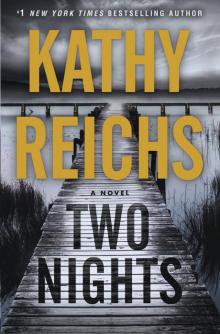 Two Nights
Two Nights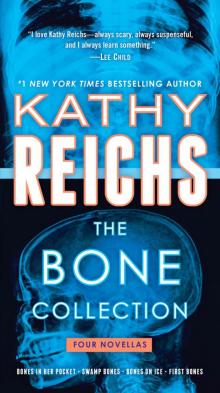 The Bone Collection: Four Novellas
The Bone Collection: Four Novellas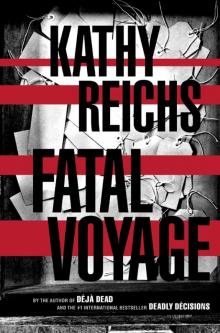 Fatal Voyage
Fatal Voyage 206 Bones
206 Bones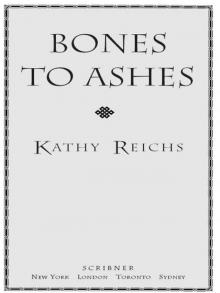 Bones to Ashes
Bones to Ashes Terminal
Terminal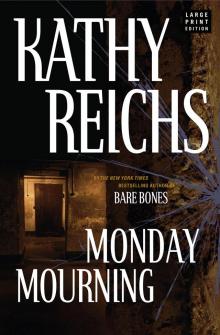 Monday Mourning
Monday Mourning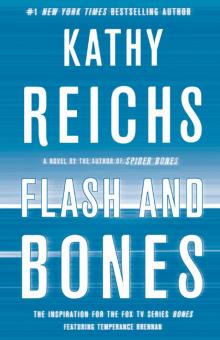 Flash and Bones
Flash and Bones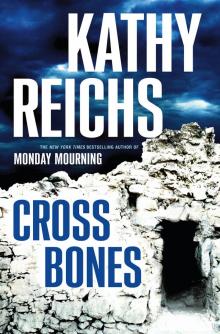 Cross Bones
Cross Bones Devil Bones
Devil Bones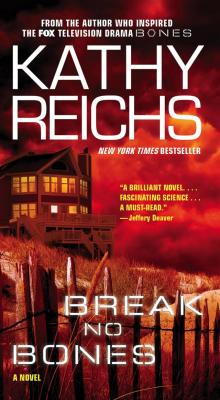 Break No Bones
Break No Bones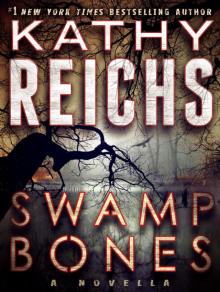 Swamp Bones
Swamp Bones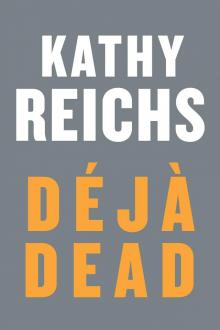 Déjà Dead
Déjà Dead Shock
Shock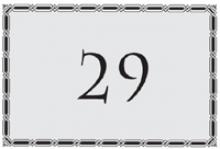 Spider Bones
Spider Bones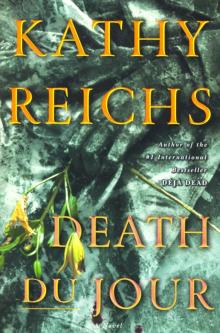 Death Du Jour
Death Du Jour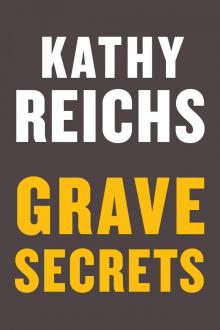 Grave Secrets
Grave Secrets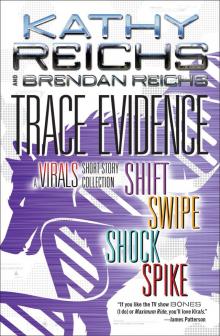 Trace Evidence: A Virals Short Story Collection
Trace Evidence: A Virals Short Story Collection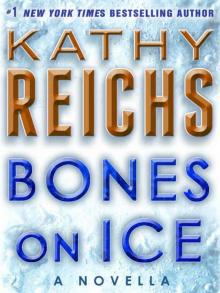 Bones on Ice
Bones on Ice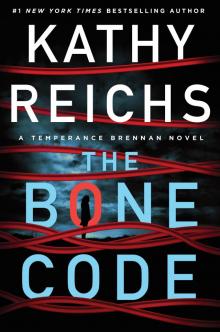 The Bone Code
The Bone Code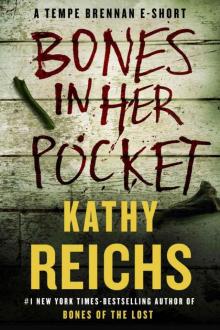 Bones in Her Pocket
Bones in Her Pocket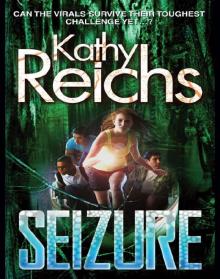 Seizure:
Seizure: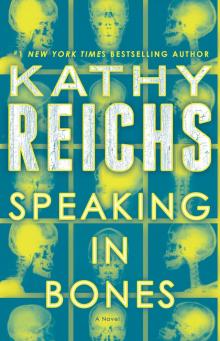 Speaking in Bones
Speaking in Bones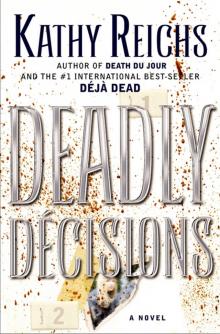 Deadly Decisions
Deadly Decisions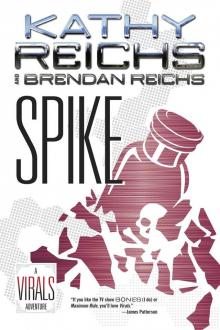 Spike
Spike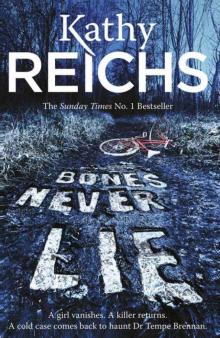 Bones Never Lie
Bones Never Lie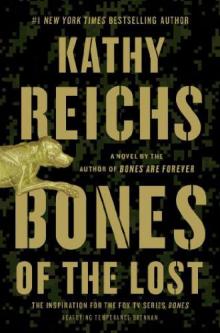 Bones of the Lost
Bones of the Lost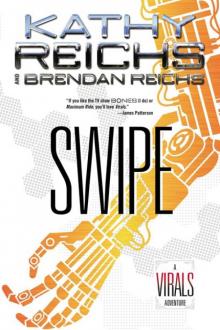 Virals 03.5 - Swipe
Virals 03.5 - Swipe Exposure
Exposure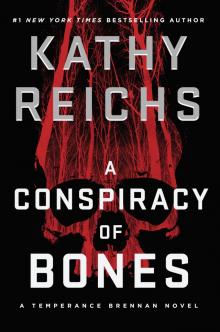 A Conspiracy of Bones
A Conspiracy of Bones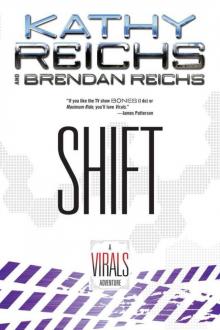 Shift (tory brennan)
Shift (tory brennan)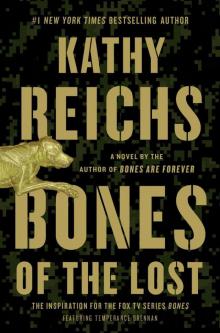 Bones of the Lost: A Temperance Brennan Novel tb-16
Bones of the Lost: A Temperance Brennan Novel tb-16 Virals tb-1
Virals tb-1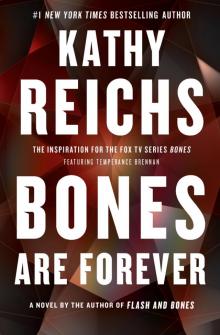 Bones Are Forever tb-15
Bones Are Forever tb-15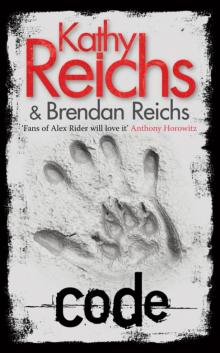 Code tb-3
Code tb-3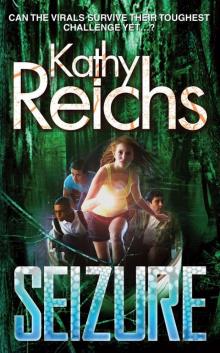 Seizure tb-2
Seizure tb-2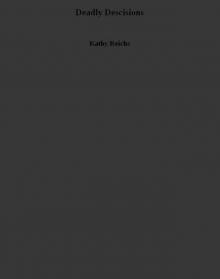 Deadly Descisions
Deadly Descisions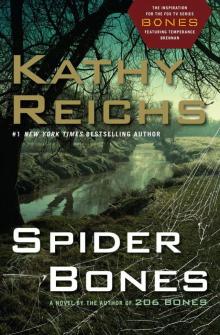 Spider Bones: A Novel
Spider Bones: A Novel